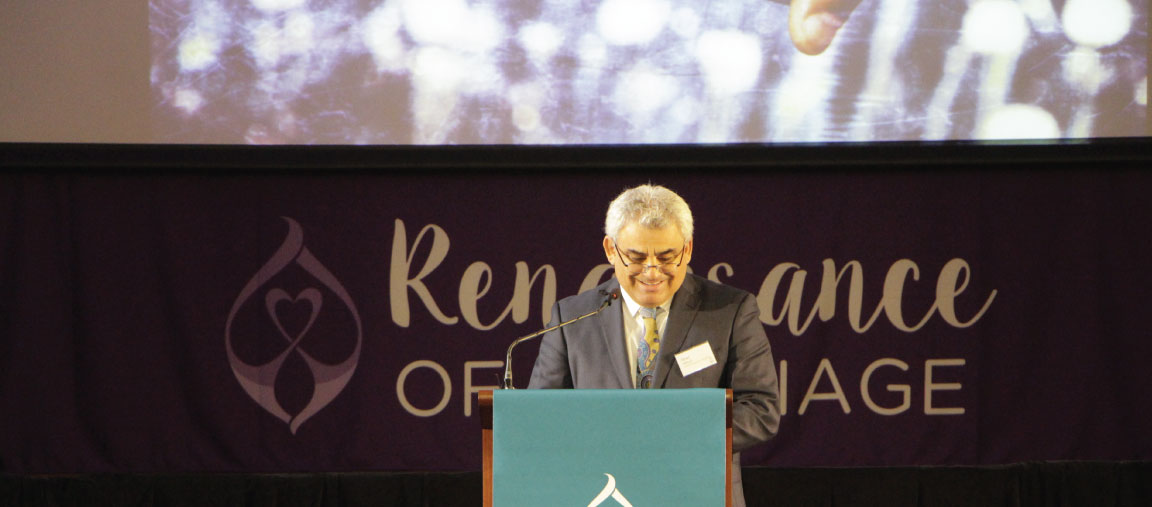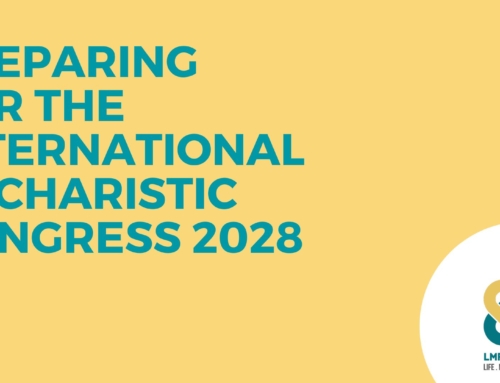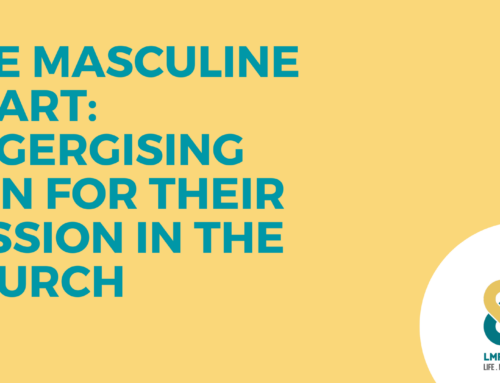This is my commandment, that you love one another, as I have loved you. John 13:34
As a father, teacher and principal; I am convinced the nothing will ever be more important to our society than the education of our young, if we are to transform the world into a better place.
In 2017 I attended the Renaissance of Marriage (ROM) Conference primarily as a professional development opportunity with a work colleague, Rachele. The conference crystallised within us both, the importance of nurturing a Catholic marriage culture in our own lives and our work in education.
I arrived home, introspective of my own marriage and asking myself and my wife; how authentic am I to the commitment made on my wedding day, to the Sacrament of Marriage and what type of role model, in marriage, am I to my wife, children and students I teach and staff I serve? ROM remains a call to action. A call to be faithful to the Gospel in marriage, to authentically be Christ’s presence in love to our families, our work and our lives.
I was once asked by a student if he should marry a very special person in his life. He said he was in love and his love was beautiful and kind. I shared how special my marriage was, but suggested he take his time in making this important life decision. Seeing the hurt look on his face ; I explained further. I married at 40 and you are 6 years old, in grade 1 and in love with your teacher who’s already married; that’s why waiting is a good idea!
I have been asked many and varied questions about love and relationships by my students and staff over 35 years of teaching; Some of these include;
- How will I know when I am in love and ready for marriage?
- I think I’m gay – Can you help me tell my parents?
- Do you think I would have made a good father- a question asked by a Christian Brother?
- If I promise to be good will my mum and dad get back together again?
- My parents are divorced; will my marriage be the same?
- Why do I have to get married if we’re already living together and have kids?
These questions whisper a deeper yearning:
- Will you teach me about my heart?
- Will you tell me I’m beautiful beyond comprehension?
- Will you teach me how to be attentive when love calls?
- Will you be present to challenge me when I am gravitating towards the counter culture of porn, infidelity, fear, mistrust and all that holds me back from love?
- Will you be my role model in faith, life and love?
Wayne Tinsey Edmund Rice Executive Director writes: A liberating education celebrates the life giving and ennobling elements within our culture and offers the Gospel’s alternatives to those definitions of reality that oppress and enslave the human spirit. … ‘Christianity teaches us to love people and use things. Our dominant culture can teach us to love things and to use people’
Think about our young people’s obsession with gaming. These games are primarily about murder, predation and dominance. Our young minds are immersed in a virtual culture of online violence and hatred.
Catholic schools therefore a called to be countercultural warriors for and in the faith building communities of love at home, school and why not online as well!
The Challenge Identified
Be strong and courageous Deuteronomy 31:6. 6
The Catholic school system I work in is Catholic in name but not always Catholic in in practice. On many occasions I have worked with staff, students and parents who are indifferent or dissociated from Catholic religious devotion and moral practice.
In 2019 the Pontifical Council for Education’s paper on Gender Identity, highlights the issue:
It is becoming increasingly clear that we are now facing with what might accurately be called an educational crisis, especially in the field of affectivity and sexuality.
The problem is compounded, for teachers who do not support the Catholic view of relationships and marriage and by a secular society which views marriage as ‘a piece of paper’.
In 2009 the Australian Family Law Act granted unmarried cohabitating couples the same post-separation financial and legal rights as married couples across Australia. There is a subtle message in this act that equates cohabitation equal to marriage; at least in the legal sense.
Many of our teachers and parents cannot differentiate between the sacrament of a Catholic marriage (matrimony) and cohabitation or civil marriage, which is very different. This is problematic given the mandate for teachers in Catholic schools to build cultures of Catholic faith and in the context of today’s gathering to share in the mission of building a Catholic marriage culture.
To compound the issue, many parents, abdicate their responsibility as educators in the faith, to teachers many of whom live radically counter cultural lives to contemporary Church teaching.
Former US President Barack Obama’s stunning autobiography titled- The audacity of hope is a powerful inspiration.
We are called by the current crisis in our fractured Church to move into the future with an audacity of hope.
The Mission of Catholic Education
Start children off on the way they should go, and even when they are old they will not turn from it. Proverbs 22:6
Pope Francis in his 2016 Apostolic Exhortation Amoris laetitia encapsulates this audacity in his achingly beautiful metaphor for our young and young at heart: “Young love needs to keep dancing towards the future with immense hope.” To further the metaphor every dancer needs a choreographer.
The mission and mandate is clear! Teachers (and by this, I mean in class, at home, I parishes and ministries) are our children’s chorographers. Anointed at Baptism we are priests, prophets and kings for our children, our Church and our world.
Yes, I too am a teacher- and each day in our classrooms is far from a dance of joy. I am aware of the pressures and constraints of teachers: helicopter parents, apathy meetings, compliance, paperwork and time deprivation.
American entrepreneur John Schlatter however gives us hope when he describes the role of a teacher beyond that which constrains our profession:
I am a warrior, daily doing battle against peer pressure, negativity, fear, conformity, prejudice, ignorance and apathy: But I have great allies: Intelligence, Curiosity, Parental Support, Individuality, Creativity, Faith, Love and Laughter all rush to my banner with indomitable support.
Support of Parents
Respect your father and mother” is the first commandment that has a promise added Ephesians 6:2
Pope John Paul 11 articulated the role of parents in Catholic education saying:
“Their role as educators is so decisive that scarcely anything can compensate for their failure in it. For it devolves on parents to create a family atmosphere so animated with love and reverence … Hence, the family is the first school of those virtues that every society needs.”
Catholic schools do not replace a parent’s role as educator but must nourish, support and provide guidance and confidence.
Providing parents with contemporary Catholic resources will assist in the education of their child at home and open dialogue about marriage and relationships.
Inviting parents and religious to our classrooms to share their hopes, dreams and understanding of their own Catholic marriage and vocation validates and gives witness to the shared responsibility to educate our children in the faith.
Employing and supporting staff who are unambiguous and unapologetic about their faith and who are committed and trained to teach our rich Catholic theology of love expressed through marriage is also a key strategy.
I wonder whether it is time to adopt a national Catholic approach to teacher (student and parent also?) formation in the Catholic faith. There are many exciting initiatives around our Archdioceses; but no unified approach.
National approaches will still have to be nuanced both in each Archdiocese but also in individual educational institutions. Whatever approach we adopt it needs to be: ongoing, rigorous, faithful to the Gospel, prayer centred and collaborative. Strategies need to be grounded in humanity, informed by social and contemporary Church teaching; a daunting task!
Unambiguous and unapologetic Catholic schools.
Therefore, everyone who hears these words of mine and puts them into practice is like a wise man who built his house on the rock. Matthew 7:24
I remember a visiting priest in my Year 10 Religious Education class asking if students had ever considered the priesthood. Our students unanimously said ….no. Father then said: “why not?” One boy spontaneously replied because no one has ever asked me!
It is timely to ask if Catholic Schools, parishes and homes have stopped teaching about marriage in the context of our Catholic faith; and if so why and what can be done to address the issue?
The important question is: What can we do as leaders in the Church, to assist families and colleagues in their role as educators and witnesses to the sacrament of marriage and the sanctity of family life?
I have been dismayed to visit classes timetabled to deliver the Catholic Family Life curriculum only to hear from the students that: these classes are a bludge -we just finish off homework. This is not an isolated incident and I have no doubt our school is not alone in this area.
If Catholic instruction is ignored in our classrooms and homes. If there is an absence of explicit Catholic teaching in our children’s lives, we run the risk of rendering Catholic education obsolete and primacy of families as the first educators redundant.
Former Principal and current Bishop Greg O Kelly is unequivocal that teachers in Catholic schools are called to share the vision of the Catholic Church.
I am unambiguous in my conviction that education is about formation. The true teacher comes into the world of his or her students as a spirit-charged prophet, teaching through his or her humanity what it is to be a good and decent human being, alive to the gifts of mind and heart, body and spirit.
St Don Bosco writes:
God, it is said, sends the world saints when they are most needed – not men and women of “general holiness,” – but specialized experts who fit into the pattern of the times and are capable of giving God’s tone to their century.
A teacher is more than a subject instructor; they are role models, father/mother figures, accidental counsellors and mentors. This is what attracts many to teaching.
Many staff say they are prepared for the academic subjects they teach, but untrained or too jaded from past experiences, unsupported or unwilling to explicitly teach the Catholic faith in the yard, staff rooms and classroom in every lesson we teach, not just Religion classes.
I hear our teachers asking Principals, clergy and Catholic Education Offices to listen empathically to their concerns and feelings of inadequacies and to respond. I do not believe there is one simple solution. God is in the ordinary and we need individual brilliance, collective wisdom and God’s grace in our actions.
We need therefore a curriculum which is authentic and clear in its theology. We need to involve our students and external experts to investigate new methods of delivering instruction to include online and virtual modes as well as face to face, heart to heart explicit teaching.
It is also important to consider the many children from Catholic and non-Catholic families who do not attend a Catholic school but who are hungering for the faith. How do we reach out to these children and their families and who will be proactive for taking responsibility for their formation; Archdioceses, Catholic Education Offices or other Church ministries?
I do not propose to have answers to these challenges. I would encourage a national discussion with leaders from across the Catholic and Christian community on issues raised. There are many exciting initiatives across Australia and internationally and yet there appears to be very little national collaboration to discern a unified approach to Catholic Marriage formation, education and resourcing. The rapid development of new technologies has made education a global phenomenon, accessible to a wider audience. Consideration is required to develop a national set of resources which brings together the very best teaching and learning from across the globe adapted for Australian use in our Catholic schools, churches and communities.
We are the keepers of the flame of our Catholic heritage. We are strengthened in a fractious world by the grace of God and in prayer. We are called to act with great joy, knowing that as prophets of hope we find God in the ordinary and extraordinary. We are also called to action. As mentioned in my introduction I pray for my marriage and for yours! I pray for the wisdom and strength to work collaboratively for and in our Church to build a strong culture of Catholic Marriage.
I thank my God
I thank my God for you every time I think of you; and every time I pray for you all, I pray with joy Philippians 1: 3-4
It is a joy for me to be in the to the presence of saints, specialised experts, cultural warriors, and spirit charged prophets in defence of our faith and united in our mission of building a rich Catholic marriage culture.
I encourage you to dance into the future with great hope. I will pray that the Australian Church and its education ministry will discern new directions for a national approach to Catholic teacher formation, marriage and relationship formation and in the production of contemporary resources to support, nourish and give confidence in our role as evangelists.
The holy Father Pope Francis blesses the faithful with this prophetic challenge:
Have the courage to be different. Don’t let yourselves get swallowed up by a society of consumption and empty appearances. What is important is the love you share, strengthened and sanctified by grace. You are capable of opting for a more modest and simple celebration in which love takes precedence over everything else.
Noel Mifsud July 26 2019 Renaissance of Marriage Conference





